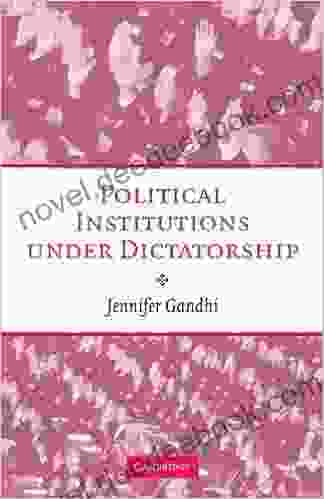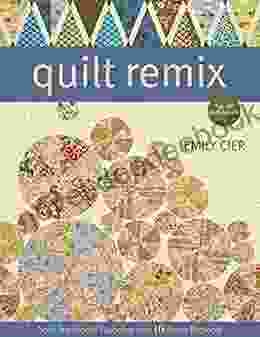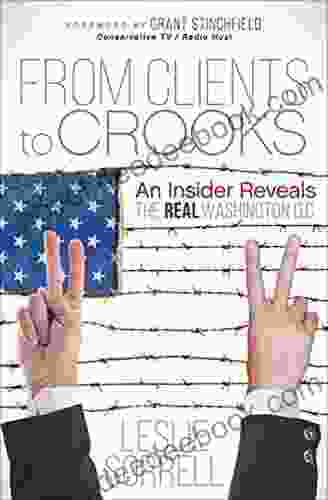Political Institutions Under Dictatorship: Jennifer Gandhi

Dictatorship is a form of government in which one person or a small group of people holds absolute power, without effective constitutional limitations. Dictatorships are often characterized by the suppression of political opposition, the use of secret police, and the control of the media.
Political institutions play a critical role in dictatorships. They can be used to legitimize the regime, control the population, and suppress dissent. In this article, we will examine the different types of political institutions that are found in dictatorships, and how they are used to maintain the dictator's power.
4.8 out of 5
| Language | : | English |
| File size | : | 2360 KB |
| Text-to-Speech | : | Enabled |
| Lending | : | Enabled |
| Screen Reader | : | Supported |
| Print length | : | 260 pages |
Types of Political Institutions in Dictatorships
There are a variety of different types of political institutions that can be found in dictatorships. These institutions can be divided into two broad categories: formal and informal.
* Formal institutions are those that are established by the dictator and have a legal basis. These institutions include the constitution, the parliament, the courts, and the military. * Informal institutions are those that are not established by the dictator but nevertheless play a role in the political system. These institutions include the secret police, the propaganda apparatus, and the ruling party.
Formal Institutions
The constitution is the supreme law of the land in a dictatorship. It sets out the basic principles of the government and the rights and duties of citizens. In many dictatorships, the constitution is written by the dictator himself and is designed to legitimize his rule.
The parliament is the legislative body in a dictatorship. It is usually composed of members who are appointed by the dictator or his supporters. The parliament's main function is to rubber-stamp the dictator's policies.
The courts are responsible for interpreting the law and applying it to individual cases. In dictatorships, the courts are often controlled by the dictator and are used to suppress dissent.
The military is responsible for maintaining order and defending the country from external threats. In dictatorships, the military is often used to suppress internal dissent and to protect the dictator's power.
Informal Institutions
The secret police is a powerful tool of repression in dictatorships. It is responsible for identifying and eliminating threats to the regime. The secret police often uses torture and other forms of coercion to extract information from suspects.
The propaganda apparatus is responsible for controlling the flow of information to the public. It is used to promote the dictator's policies and to discredit his opponents. The propaganda apparatus often uses censorship and other forms of manipulation to control the media.
The ruling party is the political party that supports the dictator. It is often the only legal political party in the country. The ruling party is used to mobilize support for the dictator and to control the population.
How Political Institutions Are Used to Maintain the Dictator's Power
Political institutions play a critical role in maintaining the dictator's power. They can be used to:
* Legitimize the regime. The constitution, the parliament, and the courts can be used to create the illusion of a legitimate government. This can help to quell dissent and to prevent people from questioning the dictator's authority. * Control the population. The secret police, the propaganda apparatus, and the ruling party can be used to control the population and to suppress dissent. This can prevent people from organizing against the dictator and from demanding change. * Suppress dissent. The courts, the secret police, and the military can be used to suppress dissent and to punish those who oppose the dictator. This can create a climate of fear and intimidation, which can prevent people from speaking out against the regime.
Political institutions play a critical role in dictatorships. They can be used to legitimize the regime, control the population, and suppress dissent. By understanding how these institutions work, we can better understand the nature of dictatorship and how to resist it.
4.8 out of 5
| Language | : | English |
| File size | : | 2360 KB |
| Text-to-Speech | : | Enabled |
| Lending | : | Enabled |
| Screen Reader | : | Supported |
| Print length | : | 260 pages |
Do you want to contribute by writing guest posts on this blog?
Please contact us and send us a resume of previous articles that you have written.
 Novel
Novel Story
Story Genre
Genre Reader
Reader Library
Library Paperback
Paperback E-book
E-book Sentence
Sentence Bookmark
Bookmark Bibliography
Bibliography Foreword
Foreword Preface
Preface Annotation
Annotation Footnote
Footnote Manuscript
Manuscript Scroll
Scroll Codex
Codex Bestseller
Bestseller Classics
Classics Library card
Library card Narrative
Narrative Memoir
Memoir Encyclopedia
Encyclopedia Dictionary
Dictionary Thesaurus
Thesaurus Narrator
Narrator Character
Character Card Catalog
Card Catalog Stacks
Stacks Periodicals
Periodicals Study
Study Journals
Journals Special Collections
Special Collections Interlibrary
Interlibrary Literacy
Literacy Thesis
Thesis Dissertation
Dissertation Storytelling
Storytelling Awards
Awards Theory
Theory J N Welch
J N Welch Franco Scardino
Franco Scardino Libby Rockaway
Libby Rockaway Gemma Perfect
Gemma Perfect Fawaz A Gerges
Fawaz A Gerges Philip John Bruch
Philip John Bruch Susana Mohel
Susana Mohel D Caroline Coile
D Caroline Coile Preston Lerner
Preston Lerner Daniel J Walkowitz
Daniel J Walkowitz Deborah Robertson
Deborah Robertson Michael Leifer
Michael Leifer Ellen Deakin
Ellen Deakin Leslie Helakoski
Leslie Helakoski Pascal Cardin
Pascal Cardin Dave Mehler
Dave Mehler Joel Townsley Rogers
Joel Townsley Rogers David H Lewis
David H Lewis Nicki Huntsman Smith
Nicki Huntsman Smith Michael Tavon
Michael Tavon
Light bulbAdvertise smarter! Our strategic ad space ensures maximum exposure. Reserve your spot today!
 Ken FollettFollow ·14.2k
Ken FollettFollow ·14.2k Ed CooperFollow ·9.1k
Ed CooperFollow ·9.1k George MartinFollow ·8.8k
George MartinFollow ·8.8k Bryson HayesFollow ·7.6k
Bryson HayesFollow ·7.6k Joe SimmonsFollow ·6.3k
Joe SimmonsFollow ·6.3k Juan RulfoFollow ·2.4k
Juan RulfoFollow ·2.4k Rick NelsonFollow ·7.1k
Rick NelsonFollow ·7.1k Colt SimmonsFollow ·19.9k
Colt SimmonsFollow ·19.9k

 Bryce Foster
Bryce FosterPerforming Asian American Women On Screen And Scene
The representation of Asian American women...

 Frank Mitchell
Frank MitchellGirl Can Draw: A Spirited and Inspiring Play by Joe...
Prologue In the realm of...

 Marc Foster
Marc FosterThe Epic Story of Race and the American Media: A Journey...
From the Shadows of Slavery to the Dawn of...

 Demetrius Carter
Demetrius CarterThe Ultimate Guide to Hiking West Virginia: Discover the...
West Virginia, often referred to as...

 Isaiah Price
Isaiah PriceThe Ten Step Guide on How to Become Famous: Unleash Your...
In the captivating world of entertainment...
4.8 out of 5
| Language | : | English |
| File size | : | 2360 KB |
| Text-to-Speech | : | Enabled |
| Lending | : | Enabled |
| Screen Reader | : | Supported |
| Print length | : | 260 pages |












